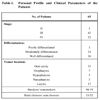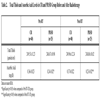- Home
- About Journals
-
Information for Authors/ReviewersEditorial Policies
Publication Fee
Publication Cycle - Process Flowchart
Online Manuscript Submission and Tracking System
Publishing Ethics and Rectitude
Authorship
Author Benefits
Reviewer Guidelines
Guest Editor Guidelines
Peer Review Workflow
Quick Track Option
Copyediting Services
Bentham Open Membership
Bentham Open Advisory Board
Archiving Policies
Fabricating and Stating False Information
Post Publication Discussions and Corrections
Editorial Management
Advertise With Us
Funding Agencies
Rate List
Kudos
General FAQs
Special Fee Waivers and Discounts
- Contact
- Help
- About Us
- Search

The Open Clinical Cancer Journal
(Discontinued)
ISSN: 1874-1894 ― Volume 5, 2011
Redox Status and Ascorbic Acid in Carcinoma of Head and Neck is Correlated to Clinical Response
Aashita Gupta1, Jitendra Verma2, M.L.B. Bhatt2 , M.K. Misra*, 1
Abstract
Human cell normally functions in a reduced state and a disturbance in the redox system precedes many pathophysiological conditions, including cancer. Radiation therapy exerts its own cytotoxic actions via production of free radicals in the body, which in turn, trigger many signaling pathways leading to apoptotic death of malignant cells but a systemic oxidative stress may intensify the condition of the disease. Ascorbic acid and thiols are the main plasma antioxidants which help fight these free radicals, and may correlate to the clinical response in head and neck cancer patients. The results of the present study indicate that thiols do not correlate but ascorbic acid correlates well to the clinical response.
Article Information
Identifiers and Pagination:
Year: 2010Volume: 4
First Page: 1
Last Page: 2
Publisher Id: TOCCJ-4-1
DOI: 10.2174/1874189401004010001
Article History:
Received Date: 29/8/2009Revision Received Date: 31/3/2010
Acceptance Date: 31/3/2010
Electronic publication date: 13/5/2010
Collection year: 2010
open-access license: This is an open access article licensed under the terms of the Creative Commons Attribution Non-Commercial License (http: //creativecommons.org/licenses/by-nc/3.0/ which permits unrestricted, non-commercial use, distribution and reproduction in any medium, provided the work is properly cited.
* Address correspondence to this author at the Department of Biochemistry, University of Lucknow, Lucknow-226007, India; Tel: +91-0522-2441064 E-mail: profmkmisra@sify.com
| Open Peer Review Details | |||
|---|---|---|---|
| Manuscript submitted on 29-8-2009 |
Original Manuscript | Redox Status and Ascorbic Acid in Carcinoma of Head and Neck is Correlated to Clinical Response | |
Cells are under elevated oxidative stress during cancer [1] and radiation, for the treatment, causes further generation of oxygen free radicals (OFR). Severe oxidative stress leads to apoptosis but persistent oxidative stress at sublethal levels may cause adaptive responses within the malignant cell that confer resistance to apoptosis [2, 3]. An antiapoptotic response to chronic oxidative stress may have severe implications for radiation therapy as the antitumor activity of radiation is to a degree, dependent on the induction of malignant cell apoptosis in response to oxidative stress and oxygen radical induced DNA damage [4].
Persistent oxidative stress within carcinoma cells may therefore cause resistance to therapy. Thiols and ascorbic acid, the critical plasma antioxidants, work cooperatively in alleviating the oxidative stress [5]. Individuals having higher levels of ascorbic acid and thiols are able to cope with the oxidative insult caused due to cancer and may respond well to the radiation therapy. The aim of the present study was to study if there is a correlation between clinical response and the plasma levels of total thiols and ascorbic acid in head and neck cancer.
Present study has been conducted in biopsy proven head and neck squamous cell carcinoma patients. The study was approved by the Departmental Ethical Committee. Informed consent was taken from all the subjects. Tumor and node size were noted and the patients staged according to AJCC-2002, TNM classification [6]. Personal profile and the clinical parameters of the patients are given in Table 1.
All the patients received chemo-radiotherapy in the form of concurrent cisplatin (35mg/m2 weekly) and radiation to a total dose of 7,000 cGy by a Cobalt-60 machine, daily single dose comprising of 200 cGy, five days a week regimen over a period of seven weeks. Throughout the course of radiation therapy, patients were monitored for tumor response and normal tissue reactions. Adverse reactions were documented as per the RTOG toxicity criteria [7]. Clinical response was characterized as complete response (CR), partial response (PR), stable disease (SD) and progressive disease (PD) by the WHO criteria [8].
Blood samples of the patients were collected before the start of any oncological treatment (Pre RT) and after the completion of radiation therapy (Post RT). Total thiols in plasma were measured by the method of Hu [9] and ascorbic acid by the method of Omaye, Turnbull and Sauberlich [10].
Out of 65 patients investigated, 40 showed complete response (CR group) and 25 showed partial response or had stable disease (PR/SD group). Results are shown in Table 2. Pre- RT levels of total thiols in the CR group and PR/SD group were similar (p>0.05) and there were no changes in either group between pre-RT and post-RT (p>0.05) total thiol levels. Both pre-RT and post-RT levels of ascorbic acid were significantly higher (p<0.05) in the CR group than in the PR/SD group. However, there were no changes in either group between pre-RT and post-RT ascorbic acid levels.
The results of the present study indicate that the patients having better response to the treatment had higher plasma levels of ascorbic acid, while the patients showing partial or no response had lower levels of ascorbic acid. None of the patients recruited in the present study had progressive disease. Thiols, the main component of redox system, were not associated with the clinical response while the levels of ascorbic acid correlate well to the clinical response.
During the course of cancer, redox system gets disturbed [5] and renders cells more susceptible to oxidative damage. Radiation may further aggravate the oxidative stress. Cells contain endogenous antioxidants and human cancer cells have decreased antioxidant levels compared to their normal tissue counterparts [11, 12], making them more sensitive to reactive oxygen species. Individuals who have higher levels of antioxidants are able to ameliorate the damaging effects of anticancer therapy on the normal cells, while the baseline sublethal oxidative stress in malignant cells is also reduced, which may cause resistance to radiation.
The unchanged thiol levels observed in the present study may be due to their oxidation under elevated oxidative stress as thiols are very susceptible to oxidative damage. Alternatively, ascorbic acid may also spare thiols from oxidation by becoming oxidized itself [13], explaining the observed decrease in ascorbic acid levels in pre-RT CR and pre-RT PR/SD groups.
ACKNOWLEDGEMENTS
One of us (AG) is thankful to UGC for a fellowship. Grants from DST under the FIST program to the Department of Biochemistry are gratefully acknowledged.


